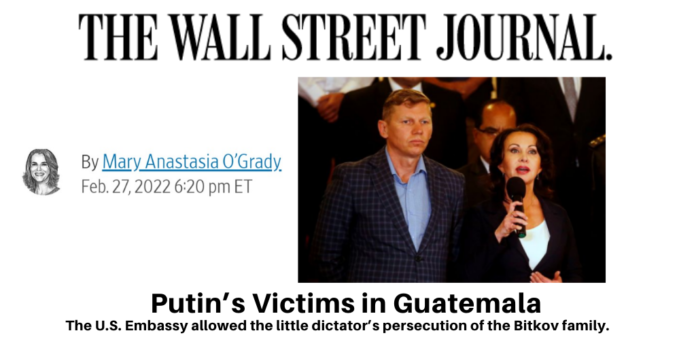The U.S. Embassy allowed the little dictator’s persecution of the Bitkov family.
Vladimir Putin’s decision to drop bombs on Kyiv last week sent shock waves through Europe and the U.S., as intended. But at home, things aren’t going so well for the little dictator with big ambitions.
Among other things, Mr. Putin’s aggression with his neighbors has sparked a renewed Russian outcry against corruption that is gaining world attention. Perhaps it can help Igor Bitkov, his wife, Irina, and their daughter, Anastasia, who more than a decade after escaping the dictator’s grip in Russia remain in legal limbo in Guatemala.
In a country where politicians readily acknowledge that the U.S. wields enormous power, it is worth asking why the State Department refuses to help a family targeted by Mr. Putin’s crime ring regain their freedom.
Russians aren’t rallying around the flag since the invasion of Ukraine on Thursday morning, as Mr. Putin may have expected them to do. Many are telling pollsters that they reject the military strikes against their neighbor. Some have even gone to the streets shouting, “No to war.”
The crackdown on these protesters is business as usual for Mr. Putin. But repression can’t reverse a growing hatred of the Kremlin boss, whose estimated wealth is at least in the tens of billions of dollars.
Russians know Mr. Putin didn’t come by his wealth honestly. His business model is a combination of knee-capping, extortion, dungeons and murder. His courts are a farce. In the Journal a few days before the invasion, Russia scholar David Satter quoted a former constitutional-court judge who put it this way: “Any official can dictate any decision in any case.” Ask opposition leader Alexei Navalny, last week given a show trial in a Russian penal colony for daring to expose Putin graft.
The Bitkovs had a successful paper-and-pulp business in 2008 when Putin henchmen offered to buy 51% of the company. The Putin political machine also asked Irina to become a party representative for Kaliningrad. The Bitkovs said no to both opportunities. Shortly thereafter, their 16-year-old daughter was kidnapped. They paid a ransom of $200,000 and got her back after she had been held for three days and raped.
The family lost their company to Mr. Putin and fled. They eventually sought refuge in Guatemala in 2009, only to be arrested by local authorities in 2015 at the behest of a Putin-owned bank working with the U.N.’s International Commission Against Impunity in Guatemala, or CICIG.
As absurd as that sounds, it actually happened: A U.N. body deputized to fight corruption in Guatemala took instructions from Putin cronies to go after and lock up a refugee family. Worse, the U.S. Embassy continued to endorse the commission’s work.
The then-U.S. ambassador to Guatemala, Todd Robinson, worked closely with CICIG even as it became clear that the commission was violating the civil liberties of its targets, including the Bitkovs. Because the U.S. was the largest financier of CICIG, the family appealed to the embassy to protect their rights. They got no results.
There was never any credible evidence to support Russia’s accusations—filed with Guatemala’s attorney general—that the Bitkovs had stolen from the Putin-owned VTB Bank. But the bank had its own problems. In 2018 the U.S. Treasury Department imposed sanctions on its chairman, Andrey Kostin.
VTB Bank’s wild claims about Bitkov fraud went nowhere. But Russian proxies in Guatemala also had gone to CICIG and asked it to investigate the family for allegedly using false identity documents.
Mysteriously the U.S.-backed commission never investigated the law firm that had secured those documents for the Bitkovs in exchange for what it said were legal fees. It’s also notable that one of the lawyers inside Guatemala’s migration office, who signed Anastasia’s temporary residency card and many other false documents, was hired by the Guatemalan attorney general’s office in 2014. In its investigation of the crime ring she was not investigated.
The Bitkovs were victims of a human-trafficking operation inside Guatemala’s migration office, not members of it. In 2017 a court cited Guatemalan and international law when it ruled that as migrants they weren’t liable for using the papers that the migration office had issued to them illegally. In April 2018 the constitutional court upheld that decision.
Three months later the same court arbitrarily reversed its decision. The Bitkovs are still fighting in court for their freedom while there are outstanding arrest warrants for an unknown number of officials who allegedly violated the law to obey CICIG.
At least four of those are fugitives being harbored by the U.S. That’s because the American left still believes in the CICIG model as a way to advance its causes abroad wherever its agenda isn’t winning at the ballot box. It wants to hide the fact that the commission not only failed but morphed into a tool of the thuggish Mr. Putin and unsavory characters in Guatemala. This is embarrassing for the State Department but by refusing to admit its errors, it is compounding them.

 English
English Русский
Русский
